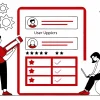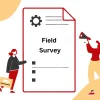
Anonymous Feedback vs Identified Feedback
The way you collect feedback can greatly impact the value and effectiveness of the insights you gather. Anonymous feedback vs identified feedback are two distinct approaches, each offering its own set of benefits and challenges.
In this article, we’ll dive into the key differences between these two methods, exploring their pros and cons. Understanding when to use anonymous feedback or identified feedback can enhance your decision-making process and improve the quality of the responses you receive.
What Is Anonymous Feedback?
Anonymous feedback is when respondents provide their opinions without revealing their identity. This approach is valuable in situations where privacy is crucial.
Anonymous feedback allows individuals to express their views freely without the fear of being identified. It is often used to encourage candidness in sensitive scenarios.
Advantages Of Anonymous Feedback
Anonymous feedback comes with several benefits that make it a popular choice for collecting honest insights.
- Encourages Honesty: Respondents feel safer sharing genuine thoughts without fear of repercussions.
- Reduces Fear of Repercussions: Knowing that their identity is protected, individuals are more open to giving truthful feedback.
- Increases Participation: People are often more willing to provide feedback if they know it will remain anonymous.
- Uncovers Sensitive Issues: Sensitive or controversial topics are more likely to be addressed when feedback is anonymous.
- Promotes Inclusivity: All individuals, regardless of status or position, can contribute freely without judgment.
Disadvantages Of Anonymous Feedback
While anonymous feedback has its strengths, it also has certain limitations that can affect the quality of the insights gathered.
- Lack of Accountability: Without knowing who provided the feedback, it’s difficult to follow up on specific concerns.
- Potential for Misuse: Anonymity can sometimes lead to unconstructive or even malicious feedback.
- Difficulty in Verification: The authenticity of anonymous feedback can be questionable, affecting the reliability of the data.
- Limited Engagement: Respondents may not invest as much thought into their feedback if they know they won’t be held accountable.
- Inconsistent Follow-Up: Addressing issues or seeking further clarification becomes challenging when the feedback is anonymous.
What Is Identified Feedback?
Identified feedback involves respondents providing their feedback along with their details. This method is often preferred when follow-up and detailed responses are necessary.
Identified feedback connects the feedback to specific individuals, which allows for direct communication and a better understanding of the issues at hand.
Advantages Of Identified Feedback
Identified feedback offers several advantages that make it ideal for situations where accountability and detailed responses are important.
- Enhanced Detail: Respondents tend to provide more comprehensive feedback when their identity is known.
- Facilitates Follow-Up: Knowing the identity of the feedback provider makes it easier to seek clarification and address specific concerns.
- Increases Accountability: Respondents are more likely to provide thoughtful and constructive feedback when their names are attached.
- Improves Relationship Building: Identified feedback can foster stronger connections between the feedback provider and the receiver.
- Enhances Credibility: Feedback linked to identifiable individuals is often seen as more reliable and credible.
Disadvantages Of Identified Feedback
Despite its benefits, identified feedback may not always be the best choice, especially in situations where privacy is a concern.
- Risk of Bias: Knowing their feedback is tied to their identity, respondents may alter their responses to avoid negative consequences.
- Reduced Candidness: Fear of retaliation or judgment may prevent individuals from being fully honest.
- Privacy Concerns: Some may hesitate to participate if they must reveal their identity, potentially skewing the feedback.
- Potential for Retaliation: In some cases, identified feedback can lead to fears of negative consequences, particularly in sensitive environments.
- Complex Data Management: Managing and protecting personal data requires additional resources to ensure privacy and compliance.
Anonymous Feedback vs Identified Feedback: Key Differences
When comparing anonymous feedback with identified feedback in healthcare, various factors influence their effectiveness. Each approach has its unique benefits and limitations, making the choice dependent on the specific goals of the healthcare provider.
1. Honesty And Candidness
- Anonymous Feedback: Encourages patients to be more honest since they don’t fear repercussions. This often leads to more genuine and unfiltered feedback.
- Identified Feedback: While patients may provide detailed responses, they might hold back on negative comments due to concerns about how it might affect their care or relationships with healthcare providers.
2. Follow-Up And Resolution
- Anonymous Feedback: Cannot follow up on specific feedback since patient identities are unknown. This can hinder addressing individual concerns.
- Identified Feedback: Facilitates direct communication with patients, allowing healthcare providers to address specific issues and provide personalized care.
3. Data Specificity And Actionability
- Anonymous Feedback: Tends to offer broader insights into general trends and issues but lacks specificity, making it harder to take targeted action.
- Identified Feedback: Provides detailed, actionable insights linked to individual patients, enabling more precise interventions and improvements.
4. Patient Privacy
- Anonymous Feedback: Offers complete privacy, which can be crucial for sensitive issues, making patients more comfortable in sharing their experiences.
- Identified Feedback: This involves sharing personal information, which might deter some patients from providing honest feedback due to privacy concerns.
5. Accountability
- Anonymous Feedback: Limits accountability as feedback cannot be traced back to an individual, making it challenging to validate the information or take specific actions.
- Identified Feedback: Enhances accountability as healthcare providers can verify the feedback and ensure that issues are addressed effectively and promptly.
6. Ease of Analysis
- Anonymous Feedback: Often results in more challenging data to analyze in a targeted way since responses are not linked to individual cases.
- Identified Feedback: This allows for more straightforward analysis, as feedback can be directly correlated with patient records and care outcomes.
Conclusion
At last, both anonymous and identified feedback methods have their respective benefits and challenges. By understanding these differences and applying best practices, you can effectively gather and utilize feedback to drive meaningful improvements and informed decision-making.
Frequently Asked Questions
What Are The Main Advantages Of Anonymous Feedback?
Anonymous feedback encourages honesty and openness by allowing respondents to share their opinions without fear of repercussions.
What Are The Potential Drawbacks Of Identified Feedback?
Identified feedback might deter some individuals from providing candid opinions due to concerns about potential negative consequences or bias.
Can Anonymous Feedback Still Be Actionable?
Yes, anonymous feedback can be actionable, but it may sometimes lack the detail needed for specific follow-up. Providing clear questions and context can help improve the usefulness of anonymous responses.
How Can I Encourage Constructive Feedback From Both Anonymous And Identified Sources?
Ensure clarity in your feedback requests, provide context and support, and focus on creating a feedback environment that values actionable and constructive insights.
Enhance Patient Care and NABH Compliance with LazyMonkey
LazyMonkey is your all-in-one solution for improving patient care, retaining more patients, and meeting NABH standards. Our powerful QR-based feedback tool enables you to capture real-time insights from patient feedback, discharge surveys, staff and doctor evaluations, and clinical research, while also streamlining inter-departmental communication.
Transform your healthcare facility today - reach out to us at hello@lazymonkey.in, or request a demo here!
Elevate Your Restaurant Experience with LazyMonkey
LazyMonkey’s QR-based feedback system helps you gather real-time insights from customers, track satisfaction levels, and enhance the dining experience. Get instant feedback on your menu, service, and ambience, and make data-driven improvements to boost repeat customers and reviews.
Improve your restaurant today – reach out to us at hello@lazymonkey.in, or request a demo here!
Empower Student Engagement and Campus Improvement with LazyMonkey
LazyMonkey offers a seamless way to gather student feedback, track satisfaction, and enhance campus life. From course evaluations to dorm feedback, our QR-based solution makes it easy to capture valuable insights and improve student retention.
Upgrade your university experience – contact us at hello@lazymonkey.in, or request a demo here!
Streamline Feedback and Drive Performance Across Your Enterprise/Franchise with LazyMonkey
Whether you manage one or multiple locations, LazyMonkey’s QR-based feedback system helps you gather real-time employee and customer feedback. Improve operational efficiency, track satisfaction, and make data-driven decisions to enhance brand consistency and growth.
Transform your franchise today – reach out to us at hello@lazymonkey.in, or request a demo here!
Enhance Customer Satisfaction and Service Standards in Banking with LazyMonkey
LazyMonkey empowers banks to capture real-time feedback from clients across branches. Improve customer experience, assess service quality, and ensure regulatory compliance with our QR-based solution, helping you retain clients and meet banking standards.
Elevate your bank’s customer care – contact us at hello@lazymonkey.in, or request a demo here!
Boost Customer Engagement and Mall Satisfaction with LazyMonkey
LazyMonkey’s QR-based feedback tool enables you to collect feedback from shoppers, track satisfaction, and enhance the mall experience. Gather insights on store services, cleanliness, and entertainment to create an unmatched customer journey.














